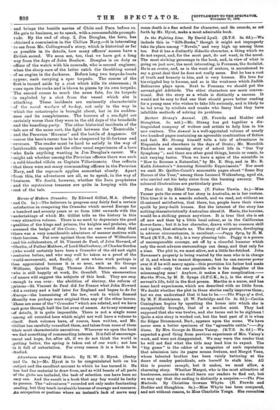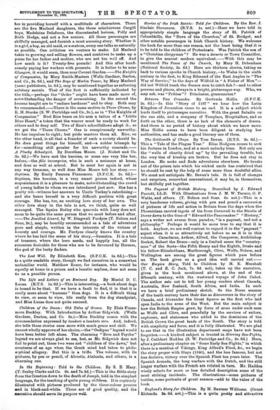That Girl. By Ethel Turner. (T. Fisher Unwin. 6s.)—Miss Turner
puts the scene of her story in Australia, as is her custom. This time it is in a seaside suburb, and we read, not without an ill-natured satisfaction, that there, too, people have their views spoilt by jerry-built houses. But the interest of the story has nothing characteristically Australian about it. Marie, the heroine, would be a striking person anywhere. It is true that she is set off now and then by a little local colour, as in the Californian flower-farm ; but it is her character, drawn with no common skill and vigour, that attracts us. The story of her genius, developing in adverse circumstances, is excellent.—Peggy Spry, by H. M. Ward (R.T.S., 2s. 6d.), is a very pleasing tale. Peggy is a person of unconquerable courage, set off by a cheerful humour which only the most adverse surroundings can damp, and that only for a time. The plot is, we must allow, not a little far-fetched. John Newsome's property is being wasted by the man who is in charge of it, and whom he cannot dispossess; but he can recover power over it if he will marry again—this provision his father had made in his will—only the one possible wife is the daughter of the mismanaging man! Anyhow, it makes a fine complication.— Martha Wren, by M. B. Synge (S.P.C.K., 2s.), is the story of a servant's life, told in the first person. Martha is a nurse, and has some hard experiences, which are described with no little force. We doubt whether the plot in these stories really improves them; but we can understand that it has to be.—The Ways of a Girl. By M. F. Hutchinson. (S. W. Partridge and Co. 2s. 6d.)—Cecilia Cuningham begins by upsetting the house into which she is unexpectedly brought, that of a maiden aunt. They had supposed that she was twelve, and she turns out to be eighteen ! Quite a nice story is worked out, but the best part of it is when Sir Edgar Drummond, Bart., appears upon the scene. We have never seen a better specimen of the "agreeable rattle."—Big Game. By Mrs. George de Horne Vaizey. (R.T.S. 3s. 6d.)—We expected a good thing from previous experience of Mrs. Vaizey's work, and were not disappointed. We may warn the reader that he will not find what the title may lead him to expect. The "big game" is the editor of a magazine of such reputation that admission into its pages means fortune, and Margot Vane, whose talented brother has been vainly battering at the doors of sundry periodicals, sets herself to stalk him. All this is pessinti exempli, but it makes, we must allow, a charming story. Whether Margot, who is the most attractive of huntresses, succeeds we shall leave our readers to find out, but we may say that the ending is distinctly a surprise.—The Five Macleods. By Christina Gowans Whyte. (H. Frowde and Hodder and Stoughton. 6s.)—Miss Whyte has been compared, and not without reason, to Miss Charlotte Yonge. She resembles her in providing herself with a multitude of characters. There are the five Macleod daughters, the three mischievous Cargill boys, Madeleine Delaforce, the discontented heiress, Polly and Ruth Hodge, and not a few seniors. All these personages are skilfully managed, and furnish a most amusing story. Whether it is a girl, a boy, an old maid, or a matron, every one talks as naturally as possible. One criticism we venture to make. Lil Macleod takes to growing and selling flowers, and contrives to make up a purse for her father and mother, who are not too well off. And how much is it ? Twenty-five pounds! And this after hand- somely paying her workers with presents. It is better to be near Glasgow, it would seem, than near Covent Garden.—The Knights of Compassion, by Mary Smith-Masters (Wells Gardner, Darton, and Co., 2s. 6d.), and The Boys of Merlin Tower, by Mary Macleod (saw. publishers, Is. 6d.), may be mentioned together as enforcing salutary morals. That of the first is sufficiently indicated by the title,—perhaps the " Order " might have been made more of, notwithstanding the danger of sermonising. In the second the lessons taught are to "endure hardness" and to obey. Both may be recommended.—There is the same motive in Three Chums, by E. M. Stooke (S. W. Partridge and Co., 2s.), as in "The Knights of Compassion." Noel Rice bears on his arm a tattoo of a "Little Blue Heart," a token that the wearer must be ready to work for others and to deny self. Two of Rice's schoolfellows adopt it ; so we get the "Three Chums." One is conspicuously unworthy. He has impulses to right ; but pride masters them all. Rice, on the other hand, is all that a founder of such a society should be. He does great things for himself, and—a nobler triumph by far—something still greater for his unworthy comrade.— A Plucky Schoolgirl. By Dorothea Moore. (J. Nisbet and Co. 35. 6d.)—We have met the heroine, or some one very like her, before,—the fills incomprise, who is such a nuisance at home, and does so well at school. But to meet her again is not in any way tiresome, so well does Miss Moore tell her story.— Septima. By Emily Pearson Finnemore. (S.P.C.K. 2s. 6d.)— Septima, the heroine, is a very smart person indeed, whose acquaintance it is a pleasure to make, notwithstanding tho crowd of young ladies to whom we are introduced just now. She has a pretty wit—witness her answers to Uncle Tnckey's catechising— and she bears herself in a very difficult position with great courage. She has, too, an exciting love story of her own. The other love story in the tale is not, we think, quite as well inauaged. The Squire Batley who quarrels with Lucy does not seem to be quite the same person that we meet before and after, The Jewelled Lizard, by W. Dingwall Fordyce (T. Nelson and Sons, 2s.), may be heartily recommended as a tale of adventure pure and simple, written in the interests of the virtues of honesty and courage. Mr. Fordyce clearly knows the country where he has laid the scene of his story,—Sumatra. It is a tale of treasure, where the hero needs, and happily has, all the resources desirable for those who are to be favoured by Hermes, the god of the lucky finders.

































































 Previous page
Previous page